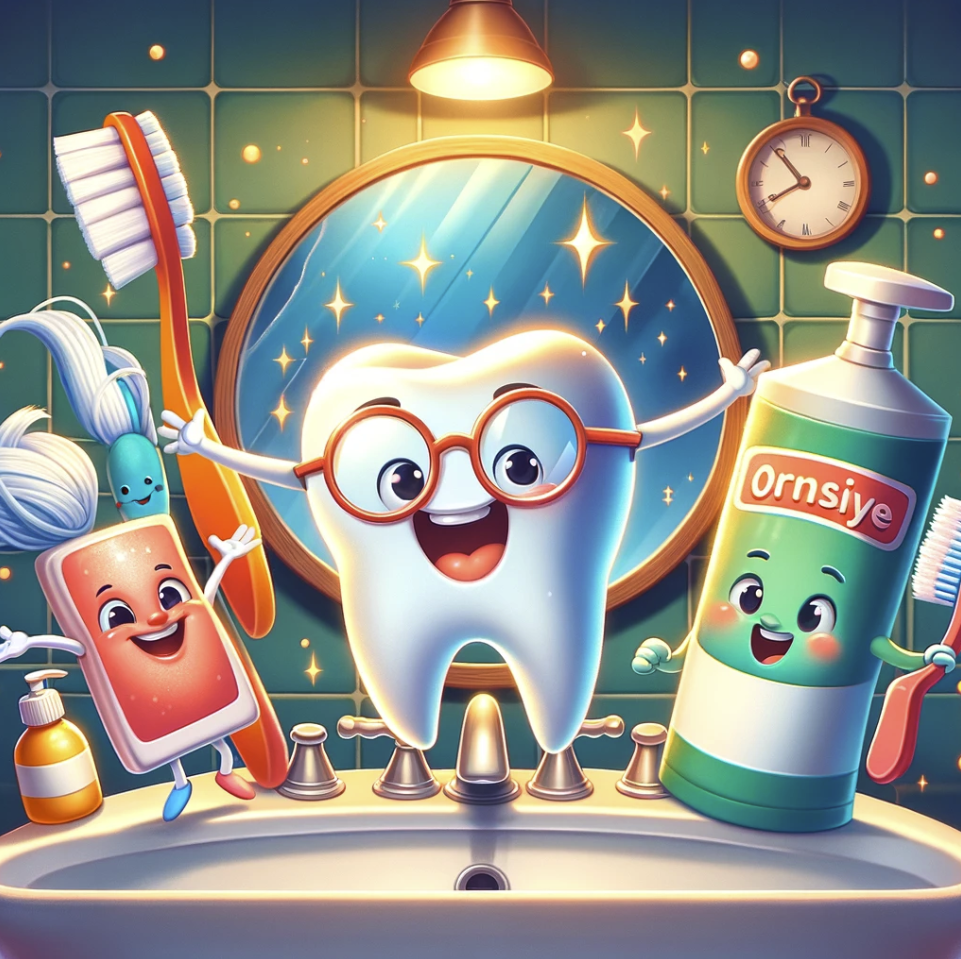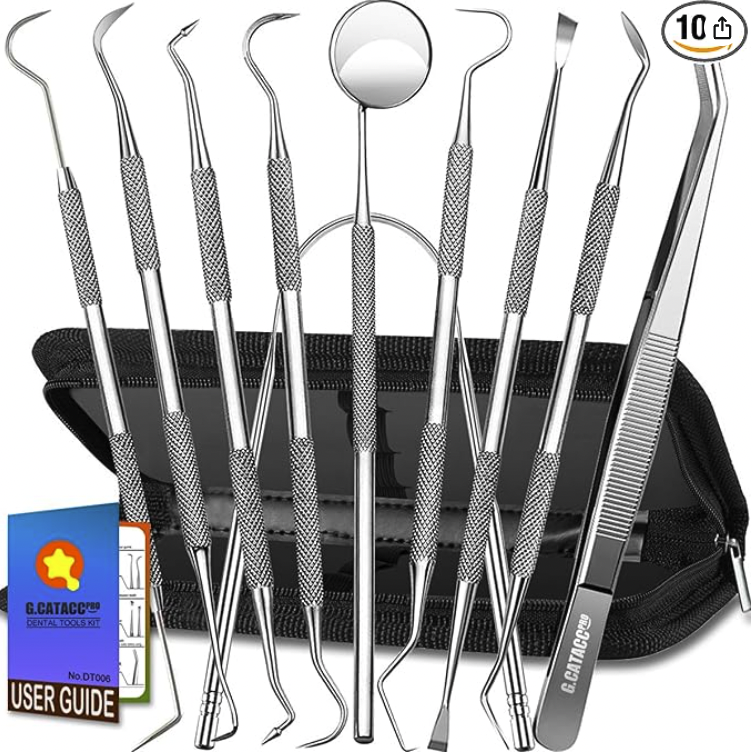Is it okay to clean your teeth at home?
With many people trying to save money or just don’t like going to the dentist, it’s a common question.
Cleaning your teeth at home is like keeping a garden tidy between professional landscaping visits.
It’s essential, but there are limits to what you can achieve without professional help.
This article explores the balance between at-home dental care and the need for professional dental services.
Table of Contents
Dental Tools for DIY Dental Care
There are dental tools available on Amazon, such as the following:
While these tools may seem useful for DIY dental care, it is important to consult with a dentist before using them.
Dentists are trained professionals who can safely and effectively remove plaque and tartar from your teeth.
They can also identify and treat any underlying dental problems that you may have.
Improper use of dental tools can damage your teeth and gums.
For example, using a scaler incorrectly can scratch the surface of your teeth, which can make them more susceptible to cavities. Additionally, using a probe too forcefully can damage your gums and lead to bleeding.
If you are concerned about plaque or tartar buildup, or if you have any other dental concerns, it is best to schedule an appointment with a dentist.
They can provide you with the professional care you need to maintain good oral health.
The Essentials of At-Home Dental Care
Brushing and Flossing: The Cornerstones
Brushing twice a day and flossing once a day are the bread and butter of dental hygiene.
Think of them as your daily defense against plaque, akin to washing dishes after every meal to prevent food buildup.
Using fluoride toothpaste strengthens tooth enamel, acting as a shield against cavities.
The Role of Mouthwash
Mouthwash serves as an extra layer of protection, reaching areas that brushing and flossing might miss.
Diet Matters
What you eat plays a big role in your dental health.
Crunchy fruits and vegetables, for instance, act like natural toothbrushes, while foods high in calcium and phosphorus support tooth enamel.
The Limitations of DIY Dental Care
While it’s tempting to address dental concerns yourself to save money or avoid the dentist’s chair, DIY dental care has serious limitations and potential dangers:
- Lack of Expertise: Dentists undergo years of education and training to understand dental anatomy, identify oral health problems, and perform procedures safely. At-home interventions lack this critical knowledge base.
- Limited Tools: Even if you acquire some dental tools, they are a far cry from the professional-grade equipment dentists use. You’re unlikely to achieve the same level of precision or effectiveness.
- Risk of Damage: Attempting DIY procedures like tartar removal or tooth whitening can damage your teeth and gums. Overly aggressive scraping can harm enamel, while improper whitening can lead to sensitivity and gum irritation.
- Hidden Problems: DIY care only addresses visible surface issues. You might miss underlying problems like cavities, infections, or early signs of gum disease that require professional intervention to prevent worsening.
- False Sense of Security: Temporary fixes or cosmetic improvements from DIY methods might give you a false sense of good oral health, delaying necessary professional treatment.
The Importance of Professional Dental Care
- Thorough cleanings: Dentists and hygienists have the tools and expertise to remove hardened tartar buildup, preventing gum disease and tooth decay.
- Early detection: Regular checkups allow dentists to catch problems in their early stages when treatment is simpler and less invasive.
- Personalized advice: Dentists provide tailored guidance on brushing, flossing, and dietary choices that best suit your specific needs.
- Safe procedures: Professional treatments like whitening, fillings, or extractions are performed in a controlled, sterile environment, minimizing risks of infection or complications.
Bottom Line: While basic oral hygiene at home is essential, it cannot replace the expertise and care provided by a dental professional. Think of DIY dental care as a temporary patch; for lasting oral health, regular visits to the dentist are crucial.
Q&A – Is It OK to Clean Your Teeth at Home? (DIY Dental Care)
Can brushing and flossing at home replace professional dental cleanings?
Brushing and flossing at home are crucial for maintaining oral hygiene but cannot replace professional dental cleanings. Dentists use specialized tools to remove tartar, which is hardened plaque that cannot be removed by brushing and flossing alone. Professional cleanings also allow dentists to check for signs of gum disease, cavities, and other potential issues that are not visible to the untrained eye.
How often should I brush and floss to maintain good dental hygiene?
The golden rule is to brush at least twice a day with fluoride toothpaste and floss once a day. This routine helps to remove food particles and plaque, a sticky film of bacteria that forms on your teeth. Regular brushing and flossing are key to preventing gum disease, cavities, and bad breath.
What are the risks of skipping professional dental cleanings?
Skipping professional dental cleanings can lead to a buildup of plaque and tartar, which can cause gum disease, tooth decay, and even tooth loss. Professional cleanings are essential for catching and addressing issues early on, potentially saving you from more extensive and expensive treatments down the line.
Can I skip dental cleanings to save money?
Skipping dental cleanings to save money can be counterproductive in the long run. Preventative care, like regular cleanings, helps to avoid more costly and complex dental procedures in the future. Investing in regular cleanings can actually save you money by maintaining your oral health and preventing the need for more significant interventions.
Are there any at-home dental tools that can help clean teeth as effectively as a dentist?
While at-home dental tools like electric toothbrushes, water flossers, and interdental brushes can significantly improve your dental hygiene routine, they cannot clean teeth as effectively as a dentist can. Professional dental tools are designed to remove tartar and reach areas of the mouth that at-home tools cannot. However, using these tools can complement professional cleanings and help maintain oral health.
How can diet impact my dental health?
Your diet plays a crucial role in your dental health. Foods high in sugar and acid can contribute to tooth decay and gum disease, while crunchy fruits and vegetables can help clean your teeth naturally. Calcium-rich foods, such as dairy products or leafy greens, can strengthen tooth enamel and support overall oral health.
What signs indicate that it’s time to visit a dentist, even if I regularly clean my teeth at home?
Signs you need to visit a dentist include persistent bad breath, toothache, swollen or bleeding gums, sensitivity to hot and cold, and any changes in the appearance of your teeth or gums. These symptoms could indicate underlying issues that require professional attention.
Can over-the-counter whitening products substitute for professional dental whitening?
Over-the-counter whitening products can offer temporary improvements in the whiteness of your teeth but are not a substitute for professional whitening treatments. Professional whitening procedures use stronger bleaching agents and offer more dramatic and lasting results under the supervision of a dentist, ensuring safety and effectiveness.
How does plaque differ from tartar, and can I remove tartar at home?
Plaque is a soft, sticky film of bacteria that forms on your teeth and can be removed by brushing and flossing. Tartar, on the other hand, is hardened plaque that has calcified on the teeth and can only be removed by a dental professional using specialized tools. Attempting to remove tartar at home can damage your teeth and gums.
What are the consequences of improper at-home dental care?
Improper at-home dental care can lead to a buildup of plaque and tartar, resulting in gum disease, tooth decay, and even tooth loss. It can also cause bad breath and discoloration of the teeth. Consistent and proper dental hygiene practices are essential for preventing these issues.
What professional dental treatments cannot be replicated at home?
Professional dental treatments such as deep cleanings (scaling and root planing), cavity fillings, root canals, dental implants, and orthodontic procedures cannot be replicated at home. These treatments require the expertise and equipment of dental professionals to diagnose and treat issues effectively, ensuring the health and safety of your teeth and gums.
Conclusion – A Balanced Approach
Maintaining your dental health is a partnership between you and your dentist.
Regular at-home care is crucial, but it’s not a substitute for professional treatment. Just as a well-maintained garden thrives with the touch of a professional gardener, your smile shines brightest with the care of a skilled dentist.
The goal is not to eliminate visits to the dentist but to make those visits as smooth and painless as possible.



